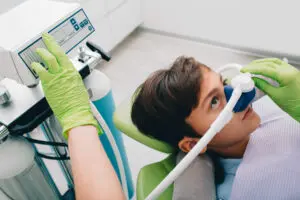
As your teen grows into their smile, there are certain thing to keep in mind. The development of their last set of molars is one of these, and without the right care,
they can cause serious damage to the look and function of their teeth. These molars, commonly called wisdom teeth, typically grow in their later teen years or even their early twenties, and our mouths are often not large enough for them. Extracting wisdom teeth helps to protect their smile from misalignment and damage to their existing teeth.
At
Great River Oral and Maxillofacial Surgeons in Dubuque, IA, we understand the importance of maintaining a quality smile, which starts with their first tooth and follows them through adulthood. Teens can often hide their discomfort or pain in order to avoid wisdom teeth extraction, so as a parent, you need to keep them on track. Find out more about this procedure or schedule their appointment by calling our office today!
 When your smile sustains a serious injury, or issues occurring during the growth and development of your smile, you could have poor balance in your jaw. This could not only impact smile beauty, but leave you vulnerable to oral health complications. Your Great River Oral and Maxillofacial Surgeons in Clinton, IA, can help with corrective jaw surgery!
When your smile sustains a serious injury, or issues occurring during the growth and development of your smile, you could have poor balance in your jaw. This could not only impact smile beauty, but leave you vulnerable to oral health complications. Your Great River Oral and Maxillofacial Surgeons in Clinton, IA, can help with corrective jaw surgery!




 As your teen grows into their smile, there are certain thing to keep in mind. The development of their last set of molars is one of these, and without the right care,
As your teen grows into their smile, there are certain thing to keep in mind. The development of their last set of molars is one of these, and without the right care,  When you suffer from tooth loss, this could eventually lead to a weakened jaw and limit your ability to receive dental implants. But with jawbone grafting, we can use oral and maxillofacial surgery to rebuild your smile! Your
When you suffer from tooth loss, this could eventually lead to a weakened jaw and limit your ability to receive dental implants. But with jawbone grafting, we can use oral and maxillofacial surgery to rebuild your smile! Your  Our team offers an array of oral surgery procedures to help smiles, from wisdom tooth extraction to dental implant placement. We want to ensure your treatment experience is a positive one, which is why we offer anesthesia. Your
Our team offers an array of oral surgery procedures to help smiles, from wisdom tooth extraction to dental implant placement. We want to ensure your treatment experience is a positive one, which is why we offer anesthesia. Your  When you lose a tooth, or especially if you’ve lost several, then you need a prosthetic to prevent major complications with your smile and your overall quality of life. With dental implants, you have a tooth replacement option that mimics natural teeth. Your
When you lose a tooth, or especially if you’ve lost several, then you need a prosthetic to prevent major complications with your smile and your overall quality of life. With dental implants, you have a tooth replacement option that mimics natural teeth. Your  As people approach their late teens and early 20s, there is a real risk of up to four new molars erupting in the smile. For many, these could cause a host of serious complications. To preserve your smile, we recommend extracting them altogether. Your
As people approach their late teens and early 20s, there is a real risk of up to four new molars erupting in the smile. For many, these could cause a host of serious complications. To preserve your smile, we recommend extracting them altogether. Your